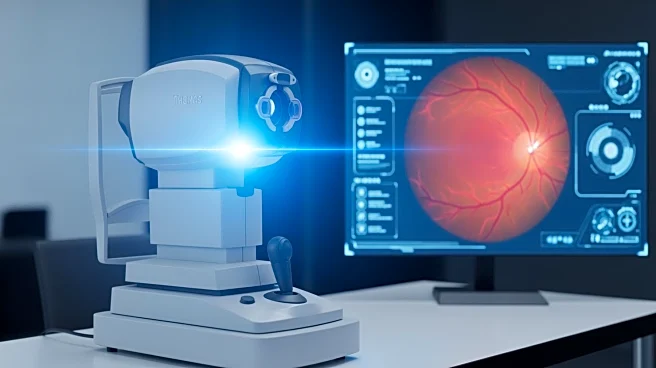What's Happening?
A recent study has demonstrated the effectiveness of deep learning (DL) algorithms in diagnosing Retinopathy of Prematurity (ROP) that requires treatment. Conducted at Khatam-Al-Anbia Eye Hospital, the study analyzed 1700 RetCam fundus images from 141
preterm infants. These images were processed using techniques like Contrast Limited Adaptive Histogram Equalisation (CLAHE) and Automated Multiscale Retinex (AMSR), alongside machine learning-based optimization. Various convolutional neural network (CNN) models, including MobileNet, ResNet-18, ResNet-50, and DenseNet-121, were evaluated for their diagnostic performance. MobileNet with CLAHE preprocessing achieved the highest accuracy and sensitivity, making it the most effective model for ROP detection. The study highlights the potential of DL models for real-time ROP screening in telemedicine settings.
Why It's Important?
The use of deep learning algorithms in diagnosing ROP is significant as it offers a promising solution for early detection and treatment, which is crucial for preventing vision loss in preterm infants. The high accuracy and sensitivity of these models can enhance telemedicine consultations, providing timely and reliable diagnoses. This advancement could lead to improved healthcare outcomes for infants at risk of ROP, particularly in regions with limited access to specialized ophthalmic care. The integration of AI in medical diagnostics represents a broader trend towards more efficient and accessible healthcare solutions.
What's Next?
Further validation of these deep learning models in diverse clinical settings is necessary to confirm their applicability in real-world scenarios. If successful, these models could be integrated into telemedicine platforms globally, improving the standard of care for preterm infants. Stakeholders in healthcare technology and policy may need to consider regulatory and ethical implications of AI-assisted diagnostics, ensuring that these tools are used responsibly and effectively.
Beyond the Headlines
The development of AI-assisted diagnostic tools raises important ethical and legal questions, such as data privacy and the potential for algorithmic bias. Ensuring that these technologies are developed and implemented with transparency and accountability will be crucial. Additionally, the success of such technologies could drive further innovation in AI applications across various medical fields, potentially transforming healthcare delivery.
















